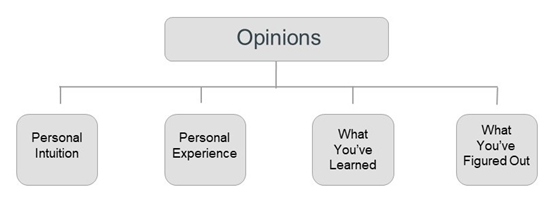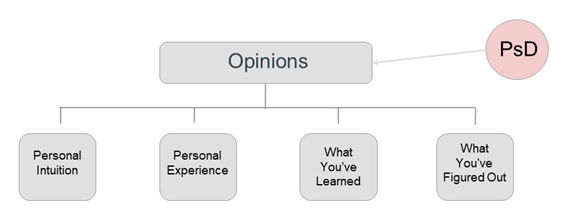PsD stands for psychological disposition and it’s the latest thing to rock the opinion world. For generations people believed that reason alone led to mutual understanding. That as we put information together, we naturally came to the same conclusion. But what they forgot is we’re emotional beings with strong associations to our human side.
The old paradigm looked like this, where opinion was simply a combination of what you felt, what you’ve experienced, what you’ve been taught, and what you’ve figured out for yourself (usually by putting pieces together from the first three).

Plato, among others, believed if we just kept talking we’d end up in the same place. That as we better understood each other’s position, we’d eventually all agree. And if you think of it, this is how we interact at work. While on the job, we mostly tune into logic. So when faced with a problem, everyone gets together to add information to the pile until we devise a sensible solution. But later, when you get home, things don’t operate like that because then we enter the world of emotions.
Think of a super-Christian or a militant vegetarian, are they using reason as the basis for their view? How about someone discussing a divorce? Or look at modern politics. Many of us hold strong emotions that cloud our understanding. So much so that some leaders could raise the Titanic with the band still playing and a large percentage of us would never grant credit. Something is going on here.
PsD
Because of emotion, the paradigm now looks like this:

When you add in emotion, a new prong emerges that influences our thoughts. PsD is this fifth element. So it’s not that you don’t understand, it’s that you can’t.
Due to psychological factors underpinning our values, when it comes to certain topics, we just can’t see things the same way. And when it’s impossible to agree, there’s no sense having an argument. Experts now use the term tribalism to define what’s going on but that’s not it. We’re no more tribal today than we were twenty years ago. We’ve just tuned into different sensors.
Caped avengers
Advertisers know all about PsD and have been using it for years. Our emotions are influenced on a daily basis to attract us toward products. Political parties and charities do the same thing. Lots of organizations know how to twist your heart. But most of us can decipher these sorts of messages because we’ve seen them before. What’s disturbing is what we don’t know. For example, how is it that emotion can override reason?
Anonymous studies show there are three sources: fear, status, and the need to be an avenger. Fear is common and everyone knows it. They scare us into believing things like Y2K and we run around like chickens without heads. Status is becoming popular since how else can you stand out in a crowd of 2200 Facebook friends. (Answering the question “who am I?” these days isn’t easy. Some take a stab at anything so families have words to write on their tombstones.) But it’s the last one that’s most interesting and also very deep.
In the Viennese school of psychotherapy, Adler, Freud, and Frankl devised three motivations to life: power, pleasure, and purpose. A lot of us identify with purpose. As a result, we’re dying for a cause. Add in something that tracks back thousands of years—the archetype of good and evil—and you see just what.
Those superhero comics didn’t sell like hotcakes simply because they were fun. Humans have a strong association with battling the forces of evil. Ever since childhood, this notion has been pounded into us along with the idea that the noble rise up. Granted mom was just telling a bedtime story but they’re there nonetheless. As a result, whenever we feel the big bad word, people grab for their sword. Based on positions taken due to thoughts placed well inside us, many believe they’re fighting the forces of evil (or serving God) while bellowing out one-sided thoughts.
So the question isn’t whether you have PsD — you do. The question is whichever the source?
Summary
Psychologists today are talking about confirmation bias, where two people watch an interview and only connect with what’s positive about their side. We used to say “you only hear what you want to hear,” but academics prefer fancier words. PsD is different. It says you can’t always think straight because of subconscious layers.
We’re emotional beings. Sometimes emotions are used against us and many times we don’t understand ourselves. But we never act this way at work because that’s a logical place. Only after five do we face issues we know little about. Here is where emotions attack. Naturally, one wishes to simplify and identifying with feelings make this easy. But don’t despair, PsD is totally treatable once you account for it. All it requires is a simple comment like this, “I don’t really know much about the matter but here is my psychological disposition.”